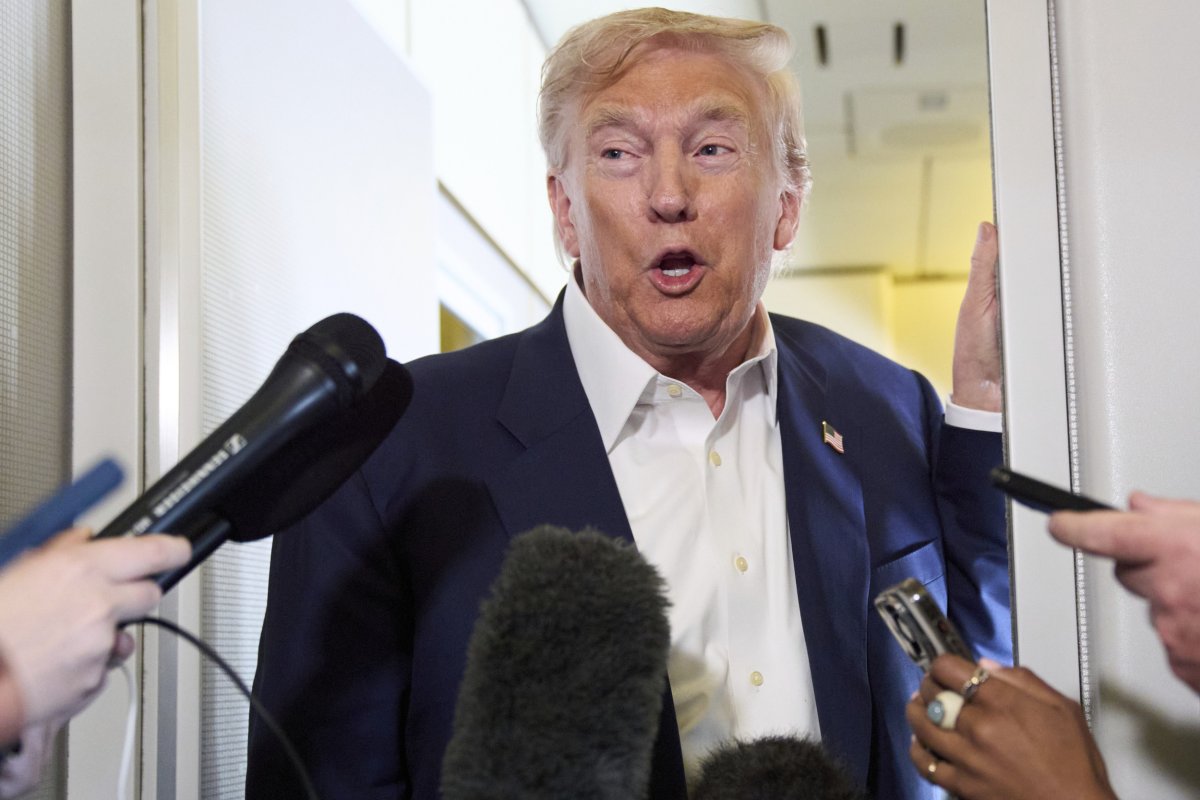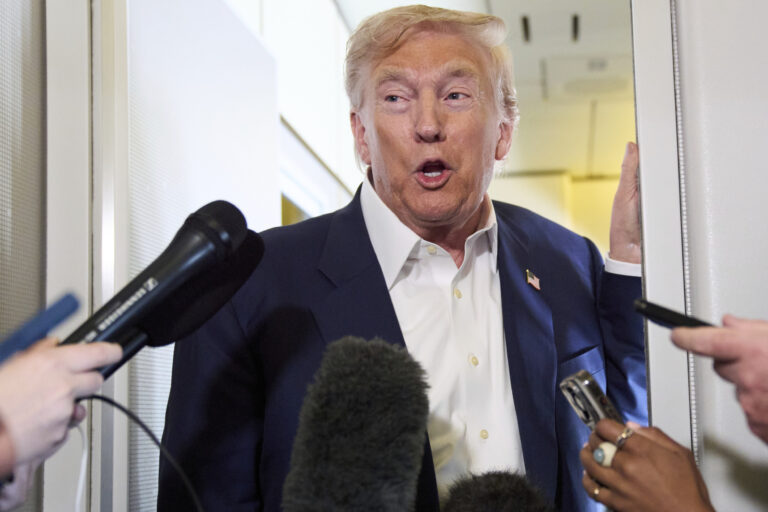President Donald Trump’s approval rating among white voters has slipped to its lowest point, according to a new YouGov/Economist poll.
The survey, conducted between July 25-28, puts Trump’s approval among white voters at 47 percent, with 49 percent disapproving, putting his net approval rating at -2 points.
That is down from last month, when 50 percent approved and 47 percent disapproved. Overall, the poll showed Trump’s net approval rating at an all-time low of -15 among all voters, down from -14 last month, making the survey one of several that have recently shown Trump’s approval rating at a low for his second term.

Jacquelyn Martin/AP
Key Voting Bloc Shows Signs Of Erosion
White voters have long been a crucial pillar of Trump’s political base, consistently providing him with strong support throughout his campaigns and first presidency. In the 2016 and 2020 elections, a significant majority of white voters, particularly those without a college degree, rallied behind Trump’s message on issues like immigration, the economy and national identity, while 56 percent voted for Trump in 2024.
But polls now suggest Trump is losing support from some of his most reliable supporters.
The decline comes amid growing pessimism about the direction of the country. Just 39 percent of white voters said the U.S. is “getting better,” down 2 points from June, while 53 percent believe things are getting worse.
Economic Concerns Undercut Confidence
Trump’s economic approval has also slipped. Just 45 percent now approve of his handling of the economy, down from 49 percent in June. Views on inflation are also negative, with 54 percent disapproving, up from 52 percent last month.
Trade policy is another area of vulnerability. With Trump’s August 1 tariff deadline for foreign governments to reach trade deals with the U.S. looming, 52 percent of white voters said American consumers would be hurt the most by tariffs, while only a minority backed Trump’s approach, signaling a level of anxiety about the economic impact of the tariffs.
The potential impact of Trump’s tariffs is significant. If deals are not reached, tariffs on U.S. food imports are scheduled to rise for more than 80 countries—affecting nearly 75 percent of U.S. food imports and likely leading to higher prices for consumers, according to the Tax Foundation.
But federal government data released on Wednesday shows the U.S. economy has mostly avoided a feared downturn from Trump’s tariffs introduced earlier this year.
Unemployment remains near historic lows, and while job growth has cooled, it’s still strong, ABC News reported.
However, inflation hit 2.7 percent in June, up from 2.4 percent the previous month, according to the Consumer Price Index, but still lower than the 3 percent when Trump took office.
Overall, economists estimate the economy grew at a 3 percent annual rate from April to June, bouncing back from a -0.5 percent decline in the previous quarter. A boost in consumer spending helped propel the economic surge, the U.S. Commerce Department said.
And the poll shows that assessments of the broader economy have remained steady over the past month. But 46 percent still say things are getting worse—far more than those who say the economy is getting better or has stayed the same. And perceptions of personal financial well-being deteriorated. Only 16 percent said they are better off financially than a year ago, unchanged from June, but those saying they are worse off rose to 36 percent, up 5 points.
Epstein Fallout Casts Shadow
But it’s not just the economy that threatens Trump’s standing with white voters.
Professor William Hall, an adjunct professor of political science and business at Webster University in St. Louis, told Newsweek the handling of the Epstein controversy may be contributing to Trump’s declining support.
While fluctuations in approval are typical, Hall argues that “what appears to be different in this case” is that the shift may be driven by discontent among White voters—including MAGA supporters—who have long been Trump’s most loyal base, but are now showing signs of “dissatisfaction, disagreement, and perhaps even disgust” with Trump’s handling of the Epstein files.
The survey shows that the newly released Jeffrey Epstein-related findings appear to be weighing on Trump’s image among white voters. A majority—56 percent—disapprove of how he has handled the situation. Some 39 percent of white voters believe Trump was involved in crimes connected to Epstein. Over 80 percent support releasing the full Epstein files, and 63 percent believe the government is engaged in a cover-up.
“This could signal the beginnings of a break in support among a potentially significant portion of his formerly solid political base,” Hall said. “Additionally, the highly sensitive nature of the allegations—involving abuse of children and a possible cover-up—has triggered an unusual level of friction between Trump and his supporters, something we haven’t seen before.
“While there may still be time to repair the relationship, the outcome remains unclear. With the 2026 midterms on the horizon, whether the Epstein Files controversy—and the Trump-MAGA rift—can be resolved is very much in question.”
Epstein, a wealthy financier and convicted sex offender, died by suicide in jail in August 2019 while awaiting trial on sex trafficking charges. There is no evidence that Trump was involved in Epstein’s crimes. Trump has acknowledged knowing Epstein in the 1990s and early 2000s but maintains that he cut ties with him well before Epstein’s 2006 arrest. A recent Wall Street Journal report uncovered a 2003 birthday card Trump allegedly sent to Epstein. The card included a drawing of a naked woman and the message: “We have certain things in common… may every day be another wonderful secret.”
Last week, the White House said Trump kicked Epstein out of his Mar-a-Lago club “for being a creep.”
On Tuesday, Trump said he fell out with Epstein after he “stole” young women who worked at his Mar-a-Lago club spa. He said that included Virginia Giuffre, who said she began working at Mar-a-Lago in the summer of 2000, when she was 16. According to court documents unsealed in 2019, Giuffre alleged that Ghislaine Maxwell recruited her to give massages to Epstein while she was employed at the resort’s spa. Maxwell is serving a 20-year prison sentence after being convicted of helping Epstein sexually abuse underage girls
Giuffre later accused Prince Andrew and Epstein of sexually abusing her—allegations both men denied. She died by suicide earlier this year in Australia.


